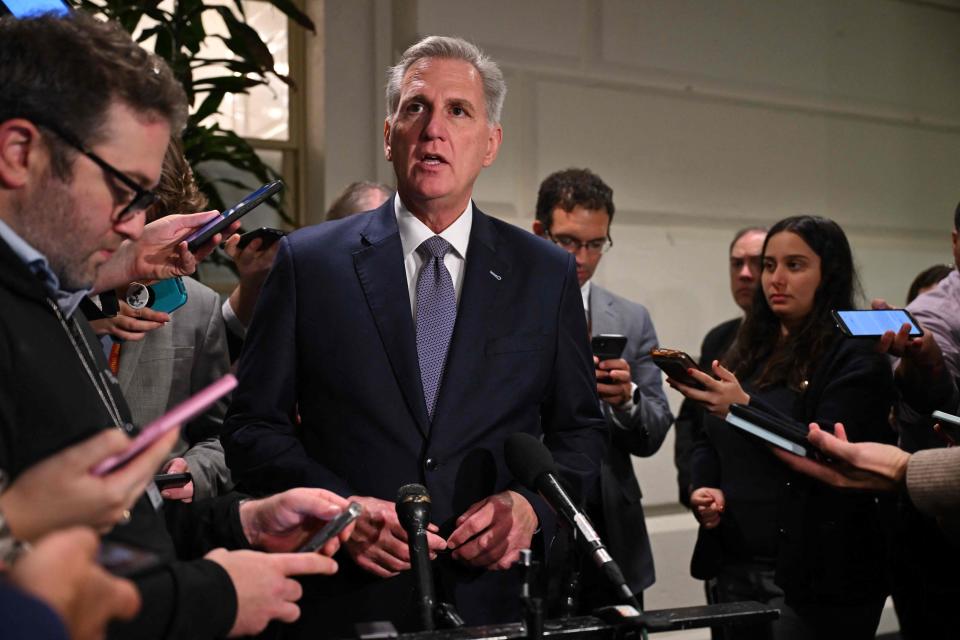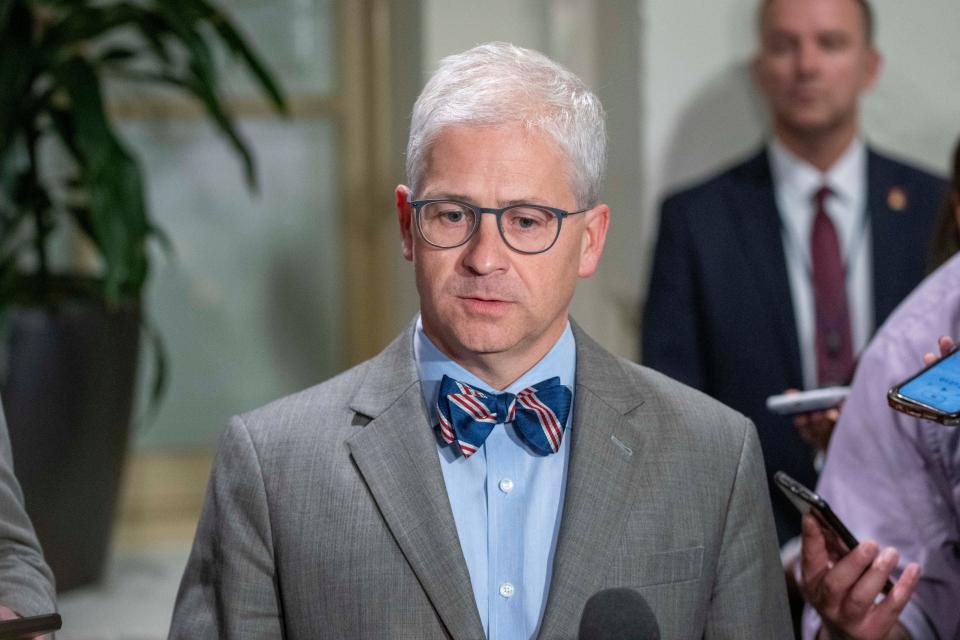Republicans rush to pick their next speaker nominee as the House grinds to a halt: What to know
- Oops!Something went wrong.Please try again later.
- Oops!Something went wrong.Please try again later.
WASHINGTON — House Republicans will try for a third time to select a speaker of the House nominee on Wednesday, casting their votes on another pick to lead the lower chamber.
Deeply divided House Republicans, roiled by infighting since they took control of the House at the start of the year, have already been unable to elect two speaker nominees: House Majority Leader Steve Scalise, R-La., and House Judiciary Committee Chair Jim Jordan, R-Ohio.
Those divisions threaten the next nominee's chances to lead the House. Whether they can garner enough support and unite House Republicans is completely up in the air.
Eight GOP lawmakers are vying for the nomination, making for a crowded field that underscores the fact there is no clear successor to ousted former Speaker Kevin McCarthy, R-Calif.
Those eight candidates offered up their visions for the speakership and took questions from members for over two hours in a candidate forum Monday evening. House Republicans will again gather behind closed doors Tuesday at 9:00 a.m. to vote on a nominee before a speaker election with the entire House. That could happen the same day.
Here’s what to know as the House enters its third week without a speaker.
Related: Cut it out. Americans by more than 2-1 tell the House to elect a speaker.

Floodgates open as eight candidates jockey for speaker
Eight GOP lawmakers are running for House speaker: Tom Emmer of Minnesota, Kevin Hern of Oklahoma, Byron Donalds of Florida, Mike Johnson of Louisiana, Austin Scott of Georgia, Jack Bergman of Michigan, Pete Sessions of Texas and Pete Sessions of Texas.
Needless to say, that’s a lot of candidates. The historic ouster of McCarthy earlier this month and the failure of the House Republican conference to elect two different speaker nominees has resulted in the mad dash among GOP lawmakers seeking the top job in the lower chamber.
Last Friday, after House Republicans voted to drop Jordan in a closed-door meeting, some members immediately declared their own candidacy, such as Hern and Scott.
“This is embarrassing for the Republican Party. It's embarrassing for the nation and we need to look at one another and solve the problem,” McCarthy said on NBC’s “Meet the Press” of the chaos that has embroiled the House.

How many votes will it take to become speaker?
The key question for any of the eight candidates is whether they can shore up enough support within the House Republican conference to be crowned speaker. The GOP controls the House with just 221 seats, and the magic number for any prospective speaker to be elected is 217. That means the eventual Republican nominee will need near-unanimous support from the conference to become speaker.
Of the eight candidates in the speaker’s race, it is unclear who can reach 217 votes.
Jordan, who was abandoned by the conference as the nominee, and Scalise, who voluntarily withdrew from the race, both had a handful of their own detractors that prevented them from ever drumming up the support required to be elected speaker.
“Getting 217 is obviously going to be very difficult and is the sort of Rubik's Cube of the answer to all of this,” Rep. Mike Turner, R-Ohio, said Sunday on CNN’s “State of the Union.”
Rep. Mike Flood, R-Neb., in an effort to ensure the next nominee has the support to become speaker, has been circulating a unity pledge for members to sign and promise they will support the eventual nominee, regardless of who it is.

Will Republicans return to the backup plan to empower interim speaker McHenry?
The House, without a speaker, has been in a state of paralysis for the last three weeks after McCarthy's removal. The chamber can continue committee work, but it cannot pass any legislation on the floor until there is a new leader.
And the House has crucial legislation to consider, including a funding package to avert a government shutdown and President Joe Biden’s request for a supplemental foreign aid package to U.S. allies, including Ukraine and Israel. Some GOP lawmakers frustrated with the legislative stasis in the House have called to temporarily empower acting speaker Rep. Patrick McHenry to get the lower chamber moving again.
Two GOP lawmakers, Reps. Dave Joyce, Ohio, and Mike Kelly, Pa., have each introduced their own resolutions empowering McHenry as interim speaker for a limited period to allow Congress to address time-sensitive issues, such as the looming shutdown.
Prior to dropping Jordan as their nominee, House Republicans debated such a move behind closed-doors, but the plans ultimately fell through as it became clear empowering McHenry would require Democratic support, a prospect some GOP lawmakers balked at.
But if House Republicans make no progress towards electing a new leader by the end of the week, frustrations among Republicans could boil over, and there could be a revival of the efforts to grant McHenry more powers.

This article originally appeared on USA TODAY: When is the next House speaker election? Republicans make their pick

